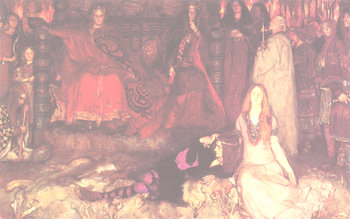
Passive
Avoiding conflict, commitment and meaningful participation. This generally occurs because an individual has no interest in a conversation but is somehow compelled to participate.Active / Assertive
Intense commitment to a conversation with the motivation to influence others. Remains civil.Aggressive
The use of negative tactics such as insult. Openly breaks the rules of civility.Passive-Aggressive
Attempts to insult, deride and intimidate without technically breaking any rules. For example, the use of sarcasm to attack people and undermine their ideas.Wit
The use of mental sharpness and speed. This can be used in both positive and negative ways. For example, wit can be used to ingratiate yourself with people or to attack them in intelligent ways. Wit almost always beats aggressive or passive-aggressive approaches and is characteristic of fearsome communicators who can dominate conversations when motivated.Active Silence
In many cases, an individual gets everything they want from a conversation without saying much. The intelligent use of silence should not be confused with a passive communication style.Analytical
An analytical and facts-oriented approach.Functional
A systematic approach such as working through a problem with a method or series of steps.Intuitive
An emotional and back-to-basics style such as appealing to people's underlying motivations.Interpersonal
Focusing on building and leveraging relationships and establishing social status.Controller
An individual who wants to control the structure of a conversation such as keeping a meeting on topic.Originator
An individual who offers creative ideas that may or may not be useful or applicable.Promoter
The promotion of ideas that you have heard somewhere.Supporter
Supporting the ideas of others either because you think they are helpful or as a means of building relationships.Expander
A tendency to continually make the conversation bigger by looking at the big picture. For example, the use of systems thinking to look at broad impacts.Closer
An individual with a drive to avoid overthinking to come to a reasonable conclusion quickly.Long-winded
Individuals who talk at significant length. This can indicate either confidence and calmness or insensitivity to the mood of the audience.Direct
Individuals who feel a pressure to keep their communication short for fear of boring someone or who naturally just kinda get to the point.Candid
Honesty and openness regardless of the implications, including the possibility of losing face. A cultural element of communication that is common in some countries and uncommon in others.Face-Saving
A group that avoids embarrassing anyone by talking about difficult topics indirectly such that you must read subtleties to understand. A cultural element of communication style.Visual
Individuals who excel at communication when they can draw a picture.Humor
The drive to enjoy a conversation with humor.Storytelling
Storytelling is the ability to make information interesting with plot, characters and other elements of a story such as drama.| Overview: Communication Style | ||
Type | ||
Definition | An approach to communication that an individual adopts in a particular situation. | |
Related Concepts | ||







































